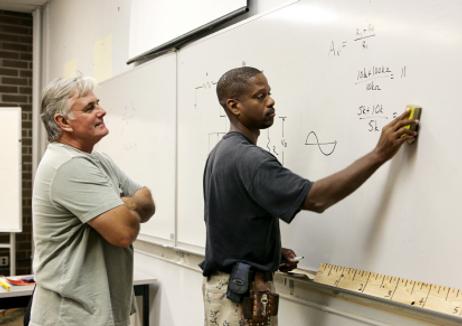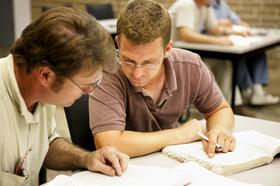The famous “all-nighter” has been a mainstay at colleges for generations, particularly during midterms and finals weeks, when students are cramming for exams. However, some community colleges across the country are now taking this popular college term to a whole new level. Instead of poring over books and lecture notes in the privacy of their bedrooms or dormitories, students are now hitting the road – and the books – to attend community college classes in the wee hours of the night. So who attends midnight classes and what is the point of offering them? While we reported on the midnight-class phenomenon in 2009, we’ll take a closer look at how this trend has grown even more in the last two years.
This video shows one person's experience with night classes.
Meeting Needs – and a Growing Demand – Head-On
Most community colleges across the country have seen enrollments grow by exponential numbers since the economy went south and more displaced workers began showing up on campus. The higher enrollment numbers have been difficult for some schools to accommodate, particularly in light of budget cuts that have also been a byproduct of a sluggish economy. The unfortunate result has been that many community colleges are forced to turn students away – an action these schools vehemently oppose. To help alleviate the problem, some schools are turning to unconventional approaches to the college experience.
“They would rather do anything than turn students away,” Norma Kent, spokesperson for the American Association of Community Colleges told USA Today. “If you’ve got faculty that’s willing to teach at an unconventional hour, then it’s a solution for a lot of things.”
Midnight courses are also cropping up to address the changing needs of the student population. Students at community colleges are more likely to have children and full-time jobs that make it challenging to make it to classes during the weekday. While most community colleges have expanded their offerings to evenings and weekends, as well as introduced online classes to accommodate these students, the midnight course option provides yet another choice to busy students. Those who work the third shift, such as police officers and hospital workers, find the late-night classes work perfectly with their schedules.
Still a Growing Trend
According to a report at Digtriad.com, the American Association of Community Colleges has discovered a growing trend of midnight course offerings. However, the relatively new fad has yet to hit many colleges across the country. For example, Digtriad.com also reports that North Carolina schools like Guilford Technical Community College and Davidson County Community College do not provide classes past evening hours. However, the schools also acknowledged they wouldn’t rule out the practice if it meant accommodating students more effectively.
“Many of our students are single parents; they work,” Connie Carroll, spokesperson for GTCC, told Digtriad.com. “They have other parts of their lives that impact their going to school time. We try to accommodate the students in various ways. We do online learning for students. We have classes that are partially face-to-face and partially online for those that need a mix.”
Where to Burn the Midnight Oil
Although many colleges are still holding out on the midnight class idea, those that have added late-night classes to their schedules have found them to be a popular choice among students. Bunker Hill Community College in Boston offered their first midnight class in 2009. At that time, the school was struggling to accommodate a student body of 13,000 students – at a campus designed to hold just 2,500. One professor suggested teaching the midnight course, and the idea caught on. Next semester, Bunker Hill will offer five midnight classes, according to the Toronto Star. Choices include Spanish, history, psychology and English.
“It’s helpful to have courses at midnight,” Charles Daniel, teacher of one of the midnight English courses, told the Toronto Star. “For those students who are working and such, it’s a great way to pick up a requirement.”
“I’m very pleased the community college system is meeting this need in the community,” Daniel added.
The Camaraderie of the Late Night Crowd
Another school offering the midnight option is Community College of Baltimore County in Maryland. A psychology professor at the school who teaches one of the late-night courses, Joy Goodie, said classes taught at this hour reap a special kind of camaraderie between students and teachers. Class participants for her course have grown into the habit of bringing food to share with the class every evening. They even invite in other late-night college staff, such as janitors, to share in the meal with them. Goodie told USA Today it helps the students appreciate those “invisible” college workers that keep the campus running during off-hours.
Goodie’s class currently meets from 12:01 to 2:55 a.m. each week. She says the students who take her course are either students who are up late anyway or those who thought they were signing up for a noon class and then realized they couldn’t drop the course. All of her students typically arrive at class awake and ready to learn. However, Goodie admitted that by 2:30, most are beginning to feel the late-night hour.
This video discusses the balancing required to study at night and maintain other activities.
While midnight classes may not be a huge trend at community colleges just yet, they are certainly a growing one. As more schools tune into the unique needs of their students and look for ways to accommodate growing student bodies in the midst of limited resources, late-night courses may become more common across the country. For those who cannot work a higher education at any other time of the day, the midnight class load may be the ticket to a degree program and more career options in the future.
Questions? Contact us on Facebook. @communitycollegereview













